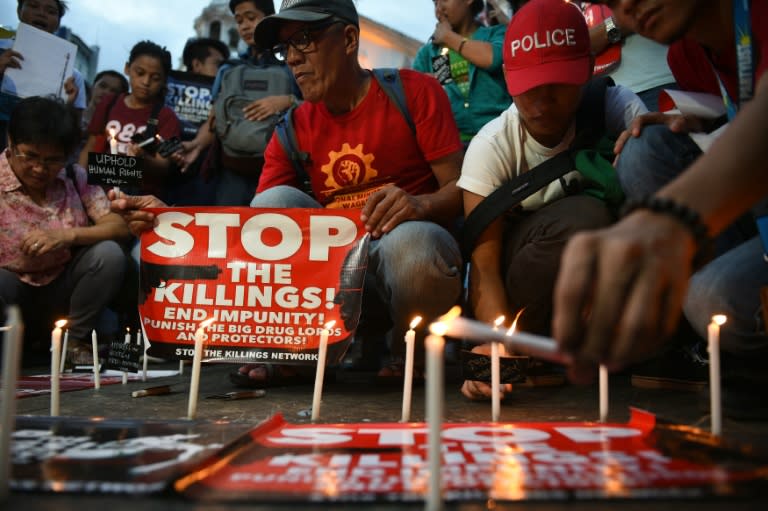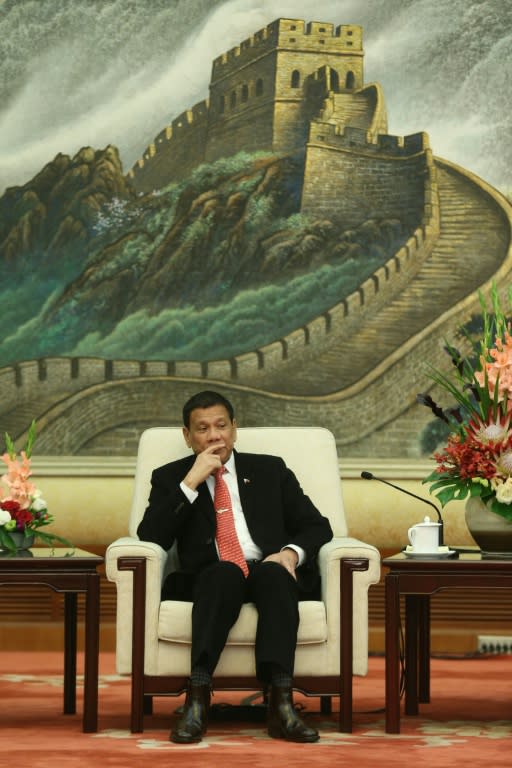Duterte causes Philippine foreign policy confusion
President Rodrigo Duterte's shock "separation" from the United States has thrown Philippine foreign policy into confusion, with the Americans saying they are baffled and some of his top aides contradicting him. The firebrand leader rarely lets a day pass without taunting or abusing the United States but his latest comments, made during a state visit to Beijing, were the strongest signal he wants to torpedo a 70-year alliance in favour of China and Russia. "I announce my separation from the United States," Duterte said Thursday as he paused to soak up the applause from hundreds of Chinese businessmen in the audience. "I've realigned myself in your ideological flow and maybe I will also go to Russia to talk to (President Vladimir) Putin and tell him that there are three of us against the world: China, Philippines and Russia. It's the only way." Until Duterte took office on June 30, the Philippines had been one of the United States' most important and loyal allies in Asia, and a key to President Barack Obama's "pivot" to the region. The Philippines had also been a bastion of democracy -- albeit a chaotic and corrupt one -- in Southeast Asia since shedding the dictatorship of Ferdinand Marcos in 1986. But Duterte, who describes himself as a socialist and has close links with communists still waging a rebellion in the Philippines, has revealed a deep dislike of the United States. He has repeatedly branded Obama a "son of a whore", and called on his countrymen to remember crimes committed by Americans when the Philippines was a colony of the United States from 1898 to 1946. Ignoring the thousands of American lives that were lost to liberate the Philippines from Japan during World War II, as well as hundreds of millions of dollars in foreign aid, Duterte has also told Filipinos that the United States had done nothing for them. He has said there will be no more joint US-Philippine patrols in the South China Sea, nor will there be any further joint military exercises with the United States that see thousands of troops pass through the Philippines each year. - Confusion, concern - Duterte's tirades are causing confusion in Washington, where officials have repeatedly said the Philippine government has not made any of his words official policy. "I just want to say that obviously we're aware of this rhetoric," US State Department spokesman John Kirby said on Thursday. "And we still hold that it is inexplicably at odds with the very close relationship that we have with the Filipino people, as well as the government there, on many different levels, not just from a security perspective." Kirby said the US government would seek an explanation on the "separation" remarks. "It's not clear to us exactly what that means in all its ramifications," he said. Kirby indicated Asian governments were also growing increasingly nervous about Duterte, who has been fiercely criticised in the West for a war on crime in which thousands of people have been killed. "It isn't just the United States who is baffled by this rhetoric. We have heard from many of our friends and partners in the region who are likewise confused about where this is going," he said. A frequent pattern following Duterte's explosive remarks against the United States, the crime war and other hot-button issues has been for his aides or cabinet ministers to try to downplay, clarify or otherwise interpret them. And within a few hours of Duterte's separation remarks, his finance and economic planning secretaries released a joint statement saying the Philippines would not break ties with Western nations. "We will maintain relations with the West but we desire stronger integration with our neighbours," they said. Trade Secretary Ramon Lopez also insisted the Philippines would not break with the United States. "I guess this will be explained better by the people around the president," Lopez told ABS-CBN television. "But what is clear to me, we're basically continuing with those activities, but it's just breaking the dependence with those countries."




